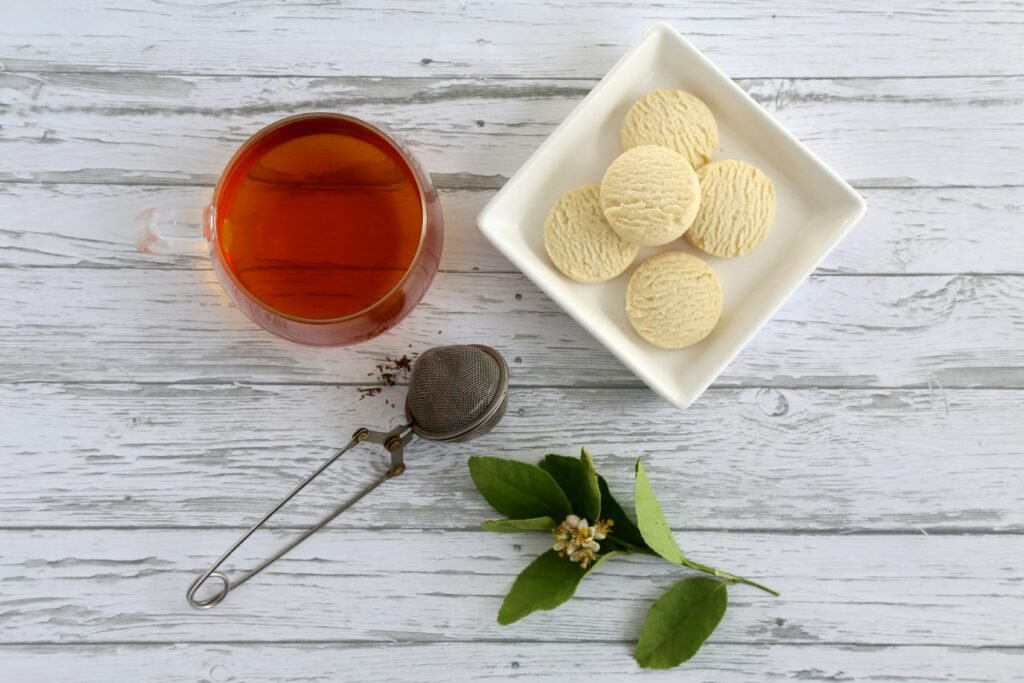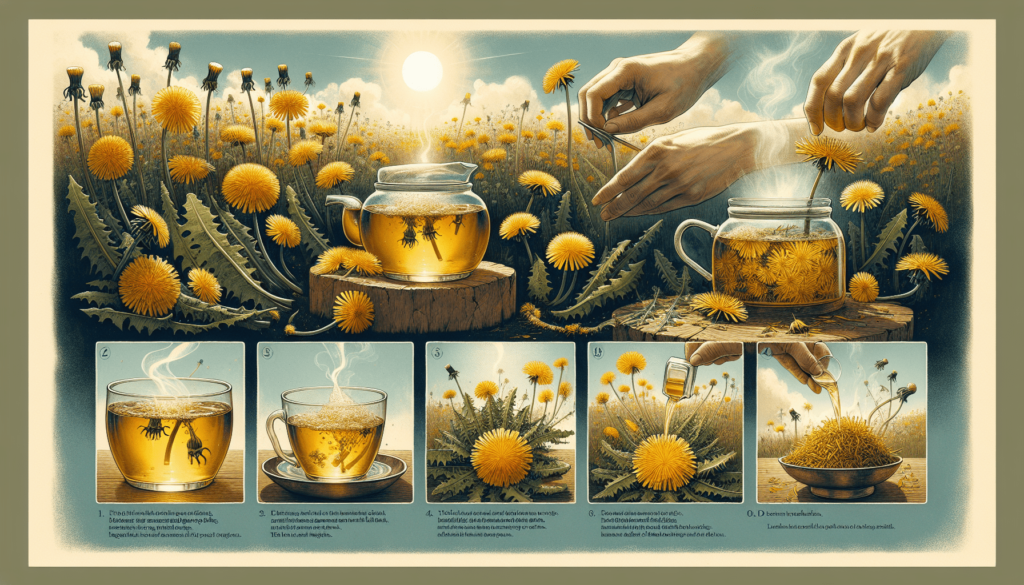If you’re looking to try something new and refreshing, dandelion tea might just be the perfect choice for you. But how do you make it? And what exactly are its health benefits? In this article, we will guide you through the simple process of making dandelion tea and explore the numerous ways it can boost your well-being. From reducing inflammation to aiding digestion, dandelion tea has a myriad of health benefits that are definitely worth discovering. So grab a cup and let’s dive into the world of dandelion tea together!

Health Benefits of Dandelion Tea
Rich in Nutrients
Dandelion tea is not only delicious but also packed with essential nutrients. It is a great source of vitamins A, C, and K, as well as minerals like calcium, iron, and potassium. These nutrients are vital for various bodily functions and contribute to your overall health and well-being.
Promotes Digestion
If you’re looking to improve your digestion, dandelion tea can be a great addition to your routine. It acts as a natural diuretic, promoting the production of urine and aiding in the elimination of toxins from the body. Additionally, dandelion tea is known to stimulate the production of digestive juices, helping to improve digestion and alleviate issues like bloating and constipation.
Detoxifies the Liver
The liver plays a crucial role in detoxifying the body and maintaining overall health. Dandelion tea has been traditionally used as a liver tonic, supporting the liver’s natural detoxification processes. It helps to flush out toxins, promote healthy liver function, and may even assist in reducing inflammation in the liver.
Boosts Immune System
A strong immune system is key to staying healthy and warding off infections. Dandelion tea contains antioxidants like vitamin C and polyphenols, which help to strengthen the immune system and protect against harmful free radicals. By regularly consuming dandelion tea, you can give your immune system the boost it needs to fight off illnesses and keep you feeling your best.
Reduces Inflammation
Chronic inflammation is linked to many health issues, including heart disease, diabetes, and certain types of cancer. Dandelion tea has anti-inflammatory properties that can help reduce inflammation in the body. It contains compounds such as flavonoids and phytonutrients that have been shown to inhibit inflammation and provide relief from inflammatory conditions.
Supports Weight Loss
If you’re on a weight loss journey, dandelion tea can be a valuable addition to your diet. It is low in calories and can act as a natural appetite suppressant, helping you feel fuller for longer. Dandelion tea may also aid in water retention and bloating, making it a popular choice for those looking to shed some extra pounds.
Improves Skin Health
Clear, healthy skin is something we all strive for, and dandelion tea can help with that. It is rich in antioxidants that help reduce the signs of aging and protect against damage caused by free radicals. Regular consumption of dandelion tea may also help with common skin issues like acne, eczema, and psoriasis.
Regulates Blood Sugar Levels
For individuals with diabetes or those at risk of developing it, maintaining stable blood sugar levels is crucial. Dandelion tea has shown promise in regulating blood sugar levels by increasing insulin sensitivity and reducing insulin resistance. Including dandelion tea in your diet may help you manage your blood sugar levels more effectively.
Enhances Bone Health
As we age, maintaining strong and healthy bones becomes increasingly important. Dandelion tea is a natural source of calcium, which is essential for bone health. It also contains other minerals like phosphorus, magnesium, and vitamin K, all of which contribute to maintaining strong bones and preventing conditions like osteoporosis.
Fights Urinary Tract Infections
Urinary tract infections (UTIs) can be uncomfortable and sometimes even painful. Dandelion tea acts as a natural diuretic, increasing urine production and helping to flush out bacteria from the urinary tract. It also has antimicrobial properties that can inhibit the growth of harmful bacteria responsible for UTIs.
Choosing and Harvesting Dandelions
Identifying Dandelions
Before you can harvest dandelions, you need to be able to identify them correctly. Dandelions are easily recognized by their bright yellow flowers and distinctive puffball seedheads. The leaves are tooth-shaped and grow close to the ground in a rosette pattern. Take the time to familiarize yourself with the appearance of dandelions to ensure you are harvesting the right plant.
Finding Quality Dandelions
When harvesting dandelions, it’s important to choose plants that are free from pesticides, herbicides, and other contaminants. Look for areas that are away from roadsides, where pollution and chemicals may be present. Opt for dandelions growing in clean, well-maintained areas such as your backyard or a trusted source.
Picking Dandelion Flowers
To harvest dandelion flowers, wait until the flowers are fully open and vibrant in color. Gently grasp the stem close to the base of the flower and give it a firm but gentle tug to remove the flower, taking care not to damage the plant or its roots. Collect the flowers in a clean container, and discard any damaged or wilted blooms.
Harvesting Dandelion Leaves
Dandelion leaves are best harvested when they are young and tender, before the plant flowers. Look for leaves that are vibrant green and free from signs of disease or damage. Carefully cut the leaves close to the base of the plant using a clean pair of scissors or gardening shears. Be sure to leave enough leaves on the plant to ensure its continued growth.
Avoiding Contaminated Areas
When foraging for dandelions, it’s crucial to avoid areas that may be contaminated with pollutants or chemicals. These can include industrial areas, heavily trafficked roadsides, or areas where pesticides are likely to have been used. Choose locations that are free from potential contamination to ensure the safety and purity of your harvested dandelions.
Drying Dandelion Flowers and Leaves
Cleaning the Flowers and Leaves
Before drying dandelion flowers and leaves, it’s important to clean them properly. Gently rinse the flowers and leaves under running water to remove any dirt, insects, or debris. Pat them dry using a clean towel or paper towels, ensuring they are completely dry before proceeding with the drying methods.
Air Drying Method
Air drying is the simplest and most traditional method for drying dandelion flowers and leaves. Gather the flowers or leaves into small bunches and tie them together with a string or rubber band. Hang the bundles upside down in a well-ventilated area, away from direct sunlight, and allow them to air dry for several days until they become crispy and brittle.
Oven Drying Method
If you prefer a quicker drying method, you can use your oven. Preheat your oven to a low temperature, around 200°F (93°C). Spread the cleaned dandelion flowers or leaves out on a baking sheet lined with parchment paper, ensuring they are in a single layer. Place the baking sheet in the oven and prop the door open slightly to allow moisture to escape. Let the dandelions dry for about 1-2 hours or until they are completely dry and crispy.
Using a Dehydrator
If you have a food dehydrator, it can be a convenient option for drying dandelion flowers and leaves. Arrange the clean flowers or leaves in a single layer on the dehydrator trays, ensuring they are not overlapping. Follow the manufacturer’s instructions for the recommended temperature and drying time. Dehydrate the dandelions until they are dry and brittle to the touch.
Storage Tips
Once the dandelion flowers and leaves are completely dry, they can be stored in airtight containers. Choose glass jars or resealable bags and label them with the date of harvest. Store the dried dandelions in a cool, dark place away from direct sunlight and moisture. Properly stored, dried dandelion flowers and leaves can remain potent for up to a year.
Making Dandelion Tea
Simple Dandelion Tea Recipe
To make a simple dandelion tea, you will need dried dandelion flowers or leaves. Bring a pot of water to a boil and add 1-2 teaspoons of dried flowers or leaves per cup of water. Cover the pot and let the mixture simmer for about 10-15 minutes. Remove from heat and strain the tea into a cup. You can enjoy your dandelion tea as is or add sweeteners like honey or stevia to taste.
Dandelion Tea with Sweetener
If you prefer a sweeter dandelion tea, you can enhance it with natural sweeteners. Once your tea is brewed, stir in a teaspoon of honey, maple syrup, or any other preferred sweetener. Adjust the amount based on your desired level of sweetness. Remember to allow the tea to cool slightly before adding the sweetener to avoid altering its taste.
Flavored Dandelion Tea
Get creative with your dandelion tea by adding flavors like citrus or herbs. For a citrus twist, stir in a squeeze of fresh lemon or orange juice into your brewed tea. You can also infuse your tea with herbs like mint or chamomile for a refreshing and aromatic flavor. Experiment with different combinations to find your perfect flavored dandelion tea.
Iced or Cold Dandelion Tea
During the hot summer months or when you’re looking for a refreshing beverage, iced or cold dandelion tea is a great option. Simply brew your dandelion tea following the simple recipe mentioned above. Let the tea cool to room temperature, then transfer it to the refrigerator to chill. Serve the chilled tea over ice and garnish with lemon slices or fresh mint leaves for an extra burst of flavor.
Alternative Dandelion Tea Recipes
Beyond the basic dandelion tea recipe, there are numerous alternative recipes you can explore. Some popular variations include adding ginger or turmeric for anti-inflammatory benefits or combining dandelion tea with other herbal teas like chamomile or green tea for added flavor and potential health benefits. Get creative in the kitchen and experiment with different combinations until you find your favorite dandelion tea recipe.

Enhancing Dandelion Tea
Adding Other Herbs and Spices
To enhance the flavor and potential health benefits of dandelion tea, you can incorporate other herbs and spices. Consider adding herbs like rosemary, thyme, or lavender for a unique flavor profile. Spices like cinnamon, ginger, or cardamom can add warmth and depth to your dandelion tea. These additions can elevate your tea experience and provide additional health benefits.
Mixing with Green Tea or Black Tea
For tea enthusiasts who enjoy blending flavors, mixing dandelion tea with green tea or black tea can create a delightful infusion. Brew your dandelion tea separately following the simple recipe. Then, mix it with an equal proportion of steeped green tea or black tea. The result is a flavorful and balanced cup of tea, combining the distinct qualities of each variety.
Combining with Lemon or Ginger
To give your dandelion tea an extra kick, consider combining it with lemon or ginger. Squeeze some fresh lemon juice into your brewed tea to add a citrusy tang and brighten the overall flavor. Alternatively, grate fresh ginger and steep it along with your dandelion tea to infuse it with a spicy and refreshing note. These additions not only enhance the taste but also provide additional health benefits.
Blending with Fruit Infusions
If you’re fond of fruity flavors, blending dandelion tea with fruit infusions can be a winning combination. Brew your dandelion tea separately and allow it to cool. Once chilled, combine it with your favorite fruit infusion, such as hibiscus or berry blend. This creates a vibrant and refreshing tea that can be enjoyed hot or cold.
Creating Full Herbal Blends
For those who love experimenting with herbal blends, creating a full herbal blend using dandelion and other complementary herbs can be exciting. Combine dried dandelion flowers or leaves with herbs like nettle, peppermint, or chamomile to create a well-rounded herbal blend. Adjust the proportions of each herb to suit your taste preferences and desired effects. Be adventurous and customize your own unique herbal blend with dandelion as the star ingredient.
Precautions and Side Effects
Possible Allergic Reactions
While dandelion is generally safe for consumption, some individuals may be allergic to it. If you have known allergies to similar plants like ragweed, marigold, or daisies, exercise caution when trying dandelion tea for the first time. Start with a small amount and monitor your body’s reaction. Discontinue use and seek medical attention if you experience any signs of an allergic reaction, such as itching, hives, or difficulty breathing.
Interactions with Medications
Dandelion tea may interact with certain medications, including diuretics, blood thinners, and medications metabolized by the liver. If you are taking any prescription medications, consult with your healthcare provider before incorporating dandelion tea into your routine to ensure it does not interfere with the efficacy or safety of your medication.
Moderation in Consumption
While dandelion tea offers numerous health benefits, it’s important to consume it in moderation. Excessive consumption of dandelion tea may lead to digestive upset or diuretic effects. Start with a small amount and gradually increase your intake while monitoring how your body responds. Always listen to your body and consult with a healthcare professional if you have any concerns.
Avoiding Dandelion if Pregnant or Nursing
Pregnant or nursing individuals should exercise caution when consuming dandelion tea. There is limited research on the effects of dandelion during pregnancy or breastfeeding, so it’s recommended to err on the side of caution and avoid it during these periods. Consult with your healthcare provider for personalized advice based on your specific situation.
Consultation with Healthcare Providers
As with any new addition to your diet or health routine, it’s advisable to consult with a healthcare provider before regularly consuming dandelion tea, especially if you have any underlying medical conditions or are taking medications. They can provide personalized guidance based on your specific health needs and help ensure optimal safety and efficacy.

Buying Dandelion Tea
Considering Organic Certification
When buying dandelion tea, consider opting for brands that have organic certification. Organic certification ensures that the tea has been produced without synthetic pesticides, herbicides, or other harmful chemicals. This guarantees a higher quality and purer form of dandelion tea, minimizing your exposure to potentially harmful substances.
Finding High-Quality Brands
Not all dandelion teas are created equal, so it’s important to choose high-quality brands. Look for reputable brands that prioritize sourcing their ingredients responsibly and follow strict quality standards. Research customer reviews, certifications, and the brand’s reputation to ensure you are purchasing dandelion tea of the highest quality.
Exploring Different Varieties
Dandelion tea is available in various forms, including tea bags, loose-leaf tea, and powdered extracts. Explore different varieties to find the one that suits your preference and convenience. Tea bags are convenient for quick brewing, while loose-leaf tea allows for a more customizable experience. Powdered extracts can be added to smoothies or other recipes for a concentrated boost of dandelion’s health benefits.
Comparing Pricing
While price shouldn’t be the sole determining factor, it’s worth comparing the pricing of different dandelion tea brands to ensure you are getting the best value for your money. Consider factors such as quantity, quality, and packaging when comparing prices. Remember that investing in high-quality dandelion tea can enhance your tea-drinking experience and potentially offer better health benefits.
Reading Customer Reviews
One of the best ways to gauge the quality and effectiveness of a particular dandelion tea brand is by reading customer reviews. Look for reviews from verified purchasers to get a sense of their experience with the product. Pay attention to feedback on taste, potency, and overall satisfaction. This can help you make an informed decision and choose the dandelion tea brand that best suits your needs.
Conclusion
In conclusion, dandelion tea offers a plethora of health benefits and can be a delightful addition to your daily routine. From promoting digestion and detoxifying the liver to boosting your immune system and improving skin health, dandelion tea is a versatile beverage that can support your overall well-being. Harvesting and drying your own dandelions can be a rewarding and cost-effective option, allowing you to enjoy the freshest and most potent tea possible. Experiment with different recipes and flavor combinations to find your perfect cup of dandelion tea. Remember to consume it in moderation, be mindful of any potential allergies or interactions with medications, and consult with a healthcare provider if needed. Embrace the versatility and health benefits of dandelion tea and enjoy a steaming cup of this remarkable herbal infusion.



